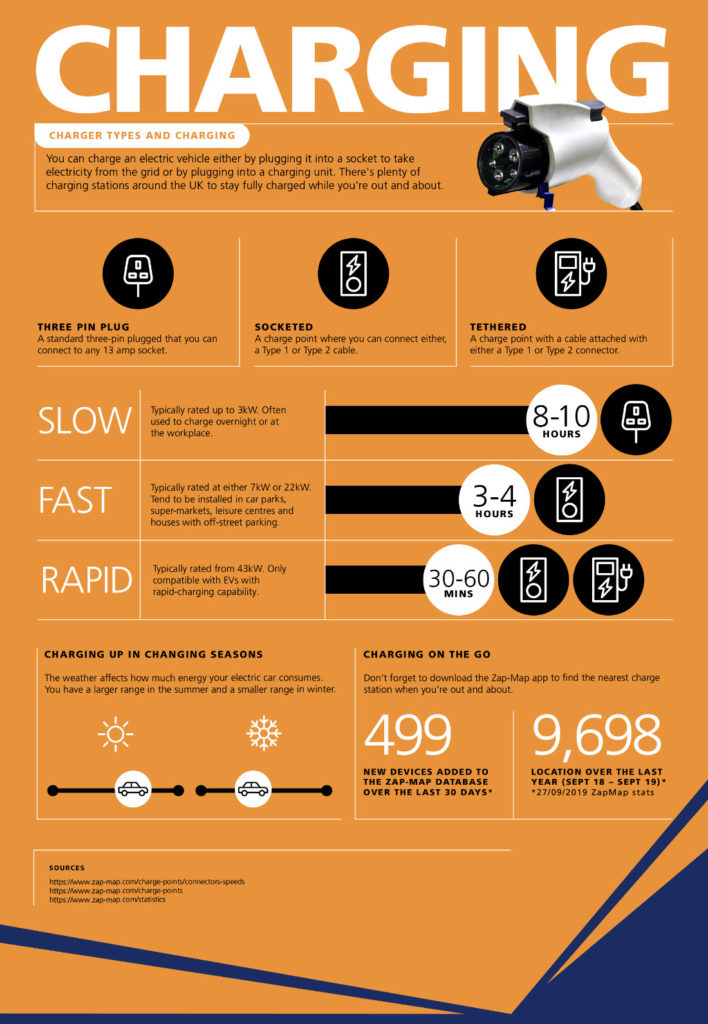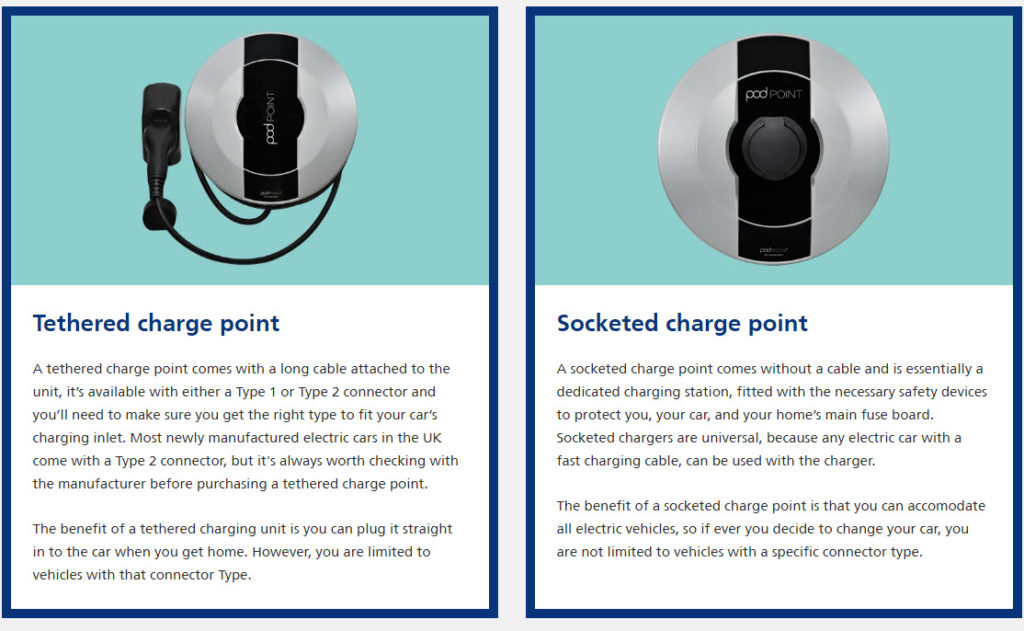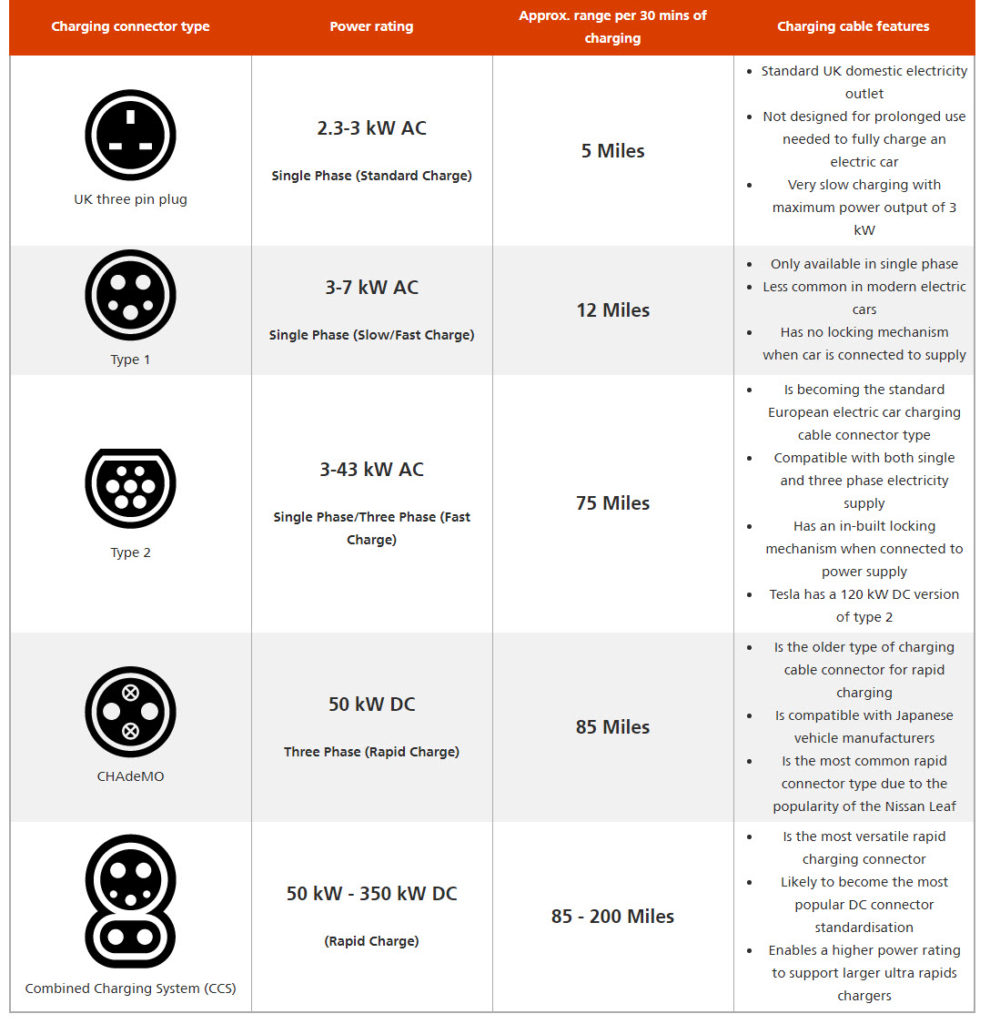All You Need To Know About Charging Your Electric Car
Thursday, 17. September 2020
There are now more than 30,000 charge points across the UK in over 11,000 locations – that’s more public places to charge than petrol stations, with around 10,000 charge points added in 2019 alone.
There are thousands of free electric car charge points in the UK, often located in supermarkets, shopping centres, public car parks, hotels and sometimes service stations.
Be aware there could be restrictions such as a set period of time or a requiring a purchase in-store, so it’s best to check.
There is an app called zap-map.com that shows all of the charge-points in the UK and also allows you to plan journeys if you are concerned about the range of your car and your ability to reach your destination without charging your car en-route.
How long does it take to charge an electric car?
How long it takes to charge an electric car is one of the most frequently asked questions. Whilst filling up with gasoline takes a few minutes, the time it takes to charge an EV from low to full is much longer.
However, it can be more convenient. Typically electric cars are charged when the car’s not in use, like overnight at home, in the same way you would a mobile phone, or during the day whilst you’re working.
How much you charge, or need to charge, will also change – with gasoline, the majority of people drive their cars until the fuel gauge shows low on fuel and we fill the tank up to full again.
This behaviour stems from the inconvenience of having to go to a petrol station. With electric cars and the convenience of charging at home, you may find you ‘top up’ the battery each day as it’s used rather than waiting for it to get low – again similar to a mobile phone.
Another factor that may impact the number of times you need to charge your electric car or van is temperature.
Lithium-ion batteries perform better in warm weather, so you might notice a slight drop in the range your EV can travel in the colder winter months.
In summary, how long it takes to charge an electric car depends on:
- Your car’s battery size
- How many miles you do between charges
- Your charging behaviour, i.e. topping up often vs charging from low to full less often
- The power rating of the charger you’re using – you can read more below on different types of chargers and their kWh ratings
To give you an idea of how long it takes to charge a specific car’s battery from zero to full, try this handy charging calculator:
Did you know?
Electric vehicles often come with battery warranties based on the number of charging cycles (1 cycle is equal to 1 full charge and 1 full discharge), with many manufacturers offering anything from 60,000 to 100,000 miles on their battery warranties as standard.
Half price evenings and weekends
Exclusive to electric car drivers, the 100% renewable(1) GoElectric tariff offers half price electricity evenings and weekends for both your household and your electric car.
This is a scheme offered by EDF Energy, there will be others available if you shop around.
Charging Point Socket Type And Speeds

Slow chargers
Slow chargers have a maximum of 3.6 kW available, and typically take between 6-12 hours to recharge a pure electric car. These chargers are ideal for overnight charging.
Fast chargers
Fast chargers are rated at 7-22 kW and usually take between 3-7 hours to recharge an EV depending on the battery size of the car.
7 kW chargers are a popular choice for the workplace and at home and there are several models available to buy and lots of different installers who can fit them for you.
It can be confusing, but all you need to do is decide what power rating you want and choose either a tethered or socketed charge point.
Rapid chargers
Rapid are the quickest (43 kW+), generally capable of charging cars to 80% in 20-40 minutes, depending on how big the battery is and how much charge it’s holding to start with, so they’re a great way to top up during long journeys.
You can often find them in motorway service car parks, petrol stations, larger shopping centres and supermarkets.
Wireless chargers
Wireless charging is super convenient and allows for the transfer energy between a pad on the ground and a compatible EV – no need for cables at all.
While it’s not in the UK yet, Norway will install the world’s first wireless electric car charging stations for Oslo taxis and BMW is due to release their new wireless charging solution with their new plug-in hybrid 530e iPerformance very soon.

What power rating should I use for my home socket?
When it comes to home charging, 3-7 kW chargers are the most popular and are widely recommended for the UK market.
Many UK households have a single-phase (AC) electricity supply and can support the additional 7 kW load. Some households, with three-phase (AC) supply can support a more powerful fast charger up to 22 kW.
However, this is far more common in countries like Germany with a more robust electricity network.
Always check with the installer that your fuse board has enough spare capacity to support the additional load of a home charging station.
If there is not enough spare capacity, then you may have to pay to upgrade your distribution board.
Rapid chargers offer you a much quicker charge, perfect for longer journeys, when a quicker charge is needed, but it’s not advisable to only use rapid charging because this can increase the degradation of your battery over time.
Electric car charging cables
Charging cables have connectors you plug into the vehicle and/or the charge point. The type of charging connector depends on the vehicle and the power rating of the charge point.

Electric car charging points grant
The Electric Vehicle Homecharge Scheme (EVHS), contributes up to 75 per cent towards the cost of buying and installing an electric charger, up to a maximum of £500, if you have a home with off-street parking suitable for an electric car charger and an eligible electric vehicle.
Similarly the Workplace Charging Scheme (WCS), contributes up to 75 per cent to a maximum of £500 for each socket, for up to 20 charge points across all of the sites they operate.
By Graham Hill with huge thanks to EDF Energy






















